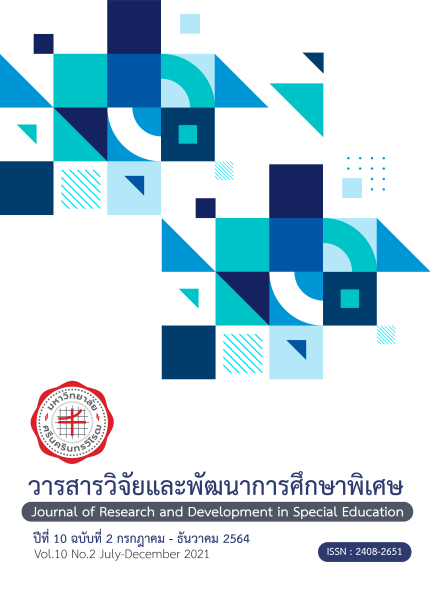การพัฒนาการกำกับอารมณ์ตนเองของนักเรียนออทิสติกโดยประยุกต์หลักสูตรโซน
Abstract
บทคัดย่อ การวิจัยครั้งนี้เป็นการวิจัยปฏิบัติการในชั้นเรียน โดยมีวัตถุประสงค์เพื่อศึกษาพัฒนาการการกำกับอารมณ์ตนเองตามแนวทางการสอนที่ประยุกต์หลักสูตรโซนของนักเรียนออทิสติก ระดับชั้นมัธยมศึกษาปีที่ 3 โรงเรียนปทุมคงคา จำนวน 1 คน ปีการศึกษา 2563 เครื่องมือที่ในการวิจัยได้แก่ แผนการสอนการกำกับอารมณ์ตนเองทั้งหมด 18 แผน ใช้เวลาสอนแผนละ 50 นาที โดยผู้วิจัยสอนให้มีความรู้ความเข้าใจเกี่ยวกับอารมณ์ต่างๆ แสดงอารมณ์ได้ถูกต้องตามสถานการณ์และรู้จักสัญญาณของร่างกายเมื่ออยู่ในอารมณ์ต่างๆ ตามด้วยการทำความรู้จักเครื่องมือที่ช่วยในการกำกับอารมณ์ตนเอง แนะนำเครื่องมือแสดงอารมณ์ตนเอง และชื่นชมยินดีกับความสำเร็จในการกำกับอารมณ์ของตนเอง ฝึกพิจารณาผลจากการกำกับอารมณ์จากอารมณ์ที่ตนเองคาดหวังเมื่อมาโรงเรียน นักเรียนรายงานตนเองแต่ละวันหลังเลิกเรียนร่วมกับการบันทึกพฤติกรรมความขัดแย้งที่ครูบันทึก 3 ช่วงเวลา คือ ช่วงเข้าแถว ช่วงทำกิจกรรมในชั้นเรียน ช่วงรับประทานอาหารกลางวัน วิเคราะห์ข้อมูลความถี่จากการสังเกตพฤติกรรมและนำเสนอด้วยแผนภูมิเส้นและตาราง ผลการวิจัย พบว่า หลังจากการสอนการกำกับอารมณ์ตนเองด้วยกระบวนการสอนที่ประยุกต์หลักสูตรโซน นักเรียนกรณีศึกษามีการกำกับอารมณ์ดีขึ้นสังเกตได้จากพฤติกรรมความขัดแย้งที่ลดลง นักเรียนสามารถระบุอารมณ์ตนเอง เลือกใช้กลยุทธ์และเครื่องมือกำกับอารมณ์ตนเองให้สามารถอยู่ในโรงเรียนอย่างมีความสุข คำสำคัญ: การพัฒนาการกำกับอารมณ์ตนเอง, หลักสูตรโซน ABSTRACT This research was a classroom action research. The purpose of this study was to study the development of self-regulation according to the teaching guideline applied the zones curriculum in a student with autism in Mathayomsuksa 3 at Patumkongka School, the academic year 2020. The research tools were: a total of 18 lesson plans for self-regulation of emotions took 50 minutes each. The researcher taught him to have a better understanding of emotions. Express emotions according to the situation and recognize the body’s signals when in different moods. Followed by getting to know the tools that help to regulate one's emotions. Introduce self-expression tools and rejoice at the achievement of self-regulation of emotions. Finally, practice considering the effects of emotional regulation on his expected emotions when he comes to school. The students self-reported after school each day together with the teacher-recorded record of conflict behavior in 3 time periods: flag-raising period, classroom activity period and during lunch. The data was analyzed with basic statistics, frequencies in behavioral observations and presented with line charts and a table. The results showed that after teaching self-regulation with the teaching guideline applied the zones curriculum, the case study had better mood regulation observed with reduced conflict behaviors. The student can identify his own emotions, choose strategies and self-management tools to stay happy in school. Keywords: Development of Self-Regulation, The Zones CurriculumDownloads
Download data is not yet available.
Downloads
Published
2021-12-31
Issue
Section
Research article




